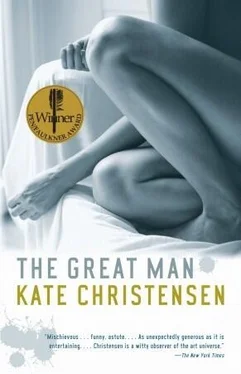“So did I, once.”
“In what?”
“English literature. I’m a big reader. But I’m not an academic type; I don’t like thinking about books that way. You have to have a very analytical mind for that kind of thing.”
“That is true.”
“I would get into a classroom and just go mute. I would have thought so much about a book like Jude the Obscure, and then when my classmates started talking about all the themes and images and whatnot, my mind went completely blank. I only cared about Jude and Sue as people. How terribly, unbelievably sad the book was. And it spoiled it for me to have to think about how it was constructed; it felt like pulling apart your favorite toy as a kid to see what was inside.” The wine must have been going to her head; she felt quite worked up about this all of a sudden. “It just killed the magic for me,” she added before she could stop herself.
Ralph looked at her expressionlessly for a moment. Abigail thought she must have sounded like an ass.
“Something similar is happening for me with Oscar, but in the opposite direction,” he said with measured precision, as if he were resisting the temptation to match her vehemence but privately shared it. “Maybe I should have written a purely intellectual book about him and never tried to find out about his life. But they convinced me that a biography was the way to go.”
“Who is ‘they’?”
“My agent,” he said. “And the editor who acquired the project. They both said it would be a better book if I wrote it from a biographical standpoint, and so I started to feel like that might be interesting and worthwhile, to do the research and tell Oscar’s life story.” He pushed his gold glasses up the bridge of his nose.
His soup and her salad appeared. The cockles were golden puffballs. They weren’t at all what she’d expected from the waiter’s description. She stole an envious look at Ralph’s soup. It looked cool, green, and light.
Ralph picked up his spoon and took a small, appreciative taste of his soup while Abigail speared a cockle with her fork. Finding it sizzling hot against her tongue, she set it back down and nibbled an asparagus spear.
“How is everything?” the waiter asked Ralph.
“Wonderful,” said Ralph.
The waiter sighed and glided off. Ralph watched him go.
“Can I ask you something?” Abigail said.
“Well of course,” he replied warily.
“This is very forward of me. I don’t want to offend you. But this might be the only chance in my life to ask this question.”
“Go ahead,” he said even more warily.
“Oh, I’ve overstepped already,” she said, horrified at herself. “Never mind.”
“Please feel free. I can always choose not to answer it.”
“Oh, well,” she said. She took another sip of the fizzy fishy-tasting wine to steady herself. “I was just wondering what it’s been like for you,” she said in a tentative voice. “To be who you are.”
“A black man?” he said. “You’re wondering what it’s like to be black?”
“Yes,” she said. “Black, and…and, well, and homosexual. I wonder how that is, because I imagine it must be very hard. I’m asking out of great sympathy, believe me, thinking that you’ve had a hard time. I admire those who struggle with their identities and…” She stopped and looked down at her plate. Ralph was silent, staring at her, his expression unreadable. “I have terribly overstepped. I apologize.”
Ralph still didn’t say anything.
“Well,” said Abigail, laughing, trying to hide the fact that she was close to tears of mortification. “I certainly have ruined a nice lunch!”
“No,” he said. “Not ruined. But I never said anything about myself. I just wonder how you got that idea. About me.”
“Oh, I always know,” said Abigail, unbearably contrite. “I don’t know how, but I do.” She shrugged.
“You just know ?” he said. There was an unmistakable note of teasing in his voice, almost relief that she had guessed his secret. “No one ever guessed before. My brother has no idea. My best friend from childhood keeps introducing me to girls. I mean women. I have a very straight personality.”
“Well, maybe you could let all that go,” she said.
“Why would I do that?”
“Because it’s…” She ate a cockle. The crust was crisp and savory; the little animal inside was meaty and sweet. “Oh my! This is very good,” she said.
“I’m not one of those people who needs to tell the whole world every detail of his life.”
“And you don’t mind, you don’t feel lonely, that your brother and your best friend have no idea…”
“I prefer it that way.”
“But what if you fall in love and want to be with someone…settle down with him?” She put down her fork and held up both hands. “I’m overstepping again. I know, I know, but I’m very interested.”
“If and when I fall in love, I will make a decision based on that particular relationship and that particular individual. I’m in no rush.”
“Well, I think that’s fascinating,” she said doubtfully.
“But truthfully, I imagine I will remain alone. That suits me. I enjoy having the possibility of defining who I am without labels or promises to anyone else. I have worked very hard to free myself from entanglements and obligations. It would have to be someone very unusual to make me want to give that up.”
“Someone like Oscar,” said Abigail before she could stop herself. She changed the subject. “Do you earn a living from your writing?”
“No,” he said. “I work at the moment as an office temp. A temporary secretary. I have a long-term position at Citibank. I have a decent salary and good hours, and I can take days off when I need them. It’s not ideal, but it’s good for now. When I go back to school, I hope to have a teaching fellowship. If this book is at all successful, it should make it much easier for me to get into a superior program like Columbia’s.”
“Your future is all laid out for you,” she said admiringly. “How old are you? You look about twenty-three.”
“I’m thirty,” he said.
Abigail couldn’t tell whether he was miffed or flattered, but she suspected that although a straight man his age would be slightly insulted, Ralph, being a homosexual, would be glad to look younger. One had to appeal to women, the other to men. “When Ethan was a little boy,” she said, “before he was diagnosed, when I thought he was normal, I used to think about his future. It was the best part of having a very small child. Because a small child is all potential. Nothing much else to rejoice about when they’re two and three. It’s a lot of mess and work and panic. But the reward is thinking about later, when all that work pays off.”
“But it didn’t pay off,” Ralph said, perturbed.
“No, it didn’t,” she replied.
They ate in silence for a moment.
“No, it continued,” she said.
Ralph looked up from his soup bowl.
“I work as hard for Ethan now as I did when he was a small boy,” she went on. “When I die, I don’t know what will happen to him; I’ve provided for his care at a small private place upstate. But will he like it there? Will he be all right?”
“Will he even know?” Ralph asked. He scraped his bowl, ate the final bite of soup. “Not to be unfeeling, but how aware is he of his surroundings? He is unusually deeply autistic, am I correct?”
“Oh! He’s keenly aware, almost painfully so at times. I try to keep things regular, simple, calm, and quiet for him because he gets so overwhelmed by change, or noise, or upheavals. My death and his move will be a shock to him. I hope he can survive it.”
“How do you know he knows if he can’t tell you?”
Читать дальше












